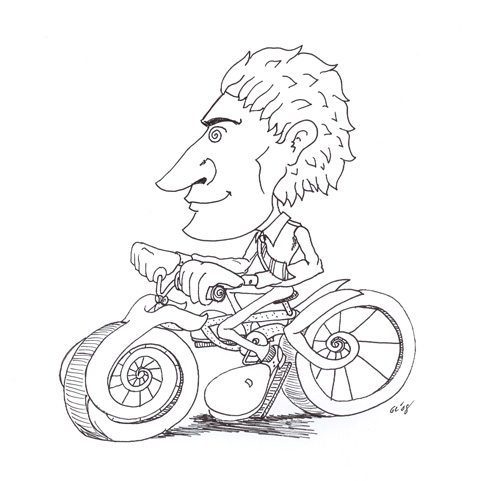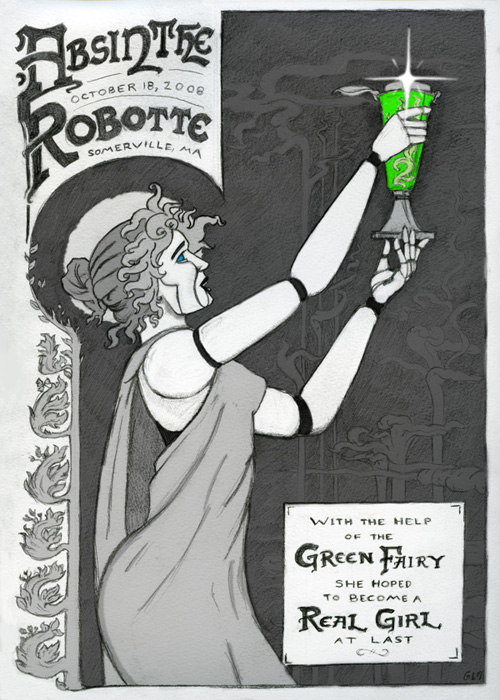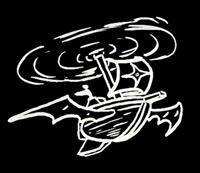
Recently in Art Category
(Note: I should preface this bit of writing with a warning: what follows is a first attempt to set down some things I've been struggling to articulate for the past couple of years. As such, it may be slightly less than ideally coherent, but hopefully out of it some clarity will emerge.)
What is literature?
It's remarkable how explosive three words can be. "I love you" and "this is war" win out in the big picture, to be sure, but among academic circles (particularly in the humanities) "what is literature" can be almost as provocative. When you start mucking about with anything so heated, it's a good idea to start out with definition, or in this case, seven:
- writings in which expression and form, in connection with ideas of permanent and universal interest, are characteristic or essential features, as poetry, novels, history, biography, and essays.
- the entire body of writings of a specific language, period, people, etc.: the literature of England.
- the writings dealing with a particular subject: the literature of ornithology.
- the profession of a writer or author.
- literary work or production.
- any kind of printed material, as circulars, leaflets, or handbills: literature describing company products.
- Archaic. polite learning; literary culture; appreciation of letters and books.
Note that the first four definitions all use variants of the word 'writing', definition six specifies printed materials, and definition seven explicitly uses the word books. (I find definition five to be absurdly insufficient: defining "literature" as "literary work or production" is like attempting to define "milk" as "milky work or production".)
And yet, and yet – imagine the outrageous clamor that would ensue if a professor were to suggest that Shakespeare should be banned from the study of literature, despite the fact that Shakespeare's works were not written to be read, but performed. In other words, Shakespeare's creations were primarily performative, not textual.
Such an argument might go as follows:
Shakespeare shouldn't be taught in literature classes, as his work was performative, not textual.
But clearly the strength of Shakespeare's work is to be found in the poetry of his words. "To be or not to be", "I will break my staff and drown my book" – these phrases have lasted for centuries due to the artfulness of their construction.
Have they? Reinterpretations of Shakespeare's works have been around almost as long as the originals; such a reimagining as West Side Story is still recognizable as Romeo and Juliet, even though it deploys none of the same language.
Perhaps this is due to a second strength of Shakespeare, which is also considered a component of literary studies: the structures of storytelling, such as character creation and plot development. It stands to reason that if Shakespeare's work were primarily performative, what should reach down through the ages are not the words and the structures but the actions, such as the dances Bob Fosse created for West Side Story, or the music by Leonard Bernstein and Stephen Sondheim. While both of these are considered exemplary, they do not fall under the definition of literary.
But why don't they? Music and dance moves can be recorded as written marks such as musical notes or dance charts – why is literature constrained to works of the alphabet? If the definition is, as suggested earlier, "writings in which expression and form, in connection with ideas of permanent and universal interest, are characteristic or essential features", and music and dance moves can both be written down, then clearly music and dance should be included in literary studies just the same as poetry, novels, history, biography or essays.
But they're not narrative.
Nowhere in the above definitions does the word 'narrative' appear.
Perhaps it should?
Poetry is studied as literature, and it's frequently not narrative. Besides, even if the word 'narrative' was included in such a definition, music, dance, film, comics and video games, robots, mobile devices or holographic television all can be used to tell stories.
But that's not their primary purpose.
It could be argued that telling stories is not the primary purpose of language, either.
Yet still, when we use the word 'literature' it remains associated with text in our mind, with language.
Of the elements I listed, only dance feels like it doesn't use language, and even then it's possible to imagine a dance performance that incorporates text or language through music, spoken words, projected text or a libretto.
Perhaps the answer is to be found elsewhere, then. In his Literary Theory, Terry Eagleton suggests that the study of English literature only came about as a way to inject formative philosophies and ideals into the minds of each new generation. Mythologies, legends, folklore, and religions serve as the literature of a culture insofar as they transmit traditions. This partly justifies the creation of a canon that is to be studied, as opposed to arguing that any text is worthy of study.
While that may be true, it fails to explain why works such as Casablanca exist in both the cultural memory and the tradition of film studies, if not literature: it's incredibly difficult to assign a particular moral value to Casablanca, but it does stand as an important work because of how it exemplifies a particular structure of creation. In the same way that The Searchers is worth experiencing as an example of the Western, or All Quiet on the Western Front stands as an exemplar of the war story.
Yet those do display "ideas of permanent and universal interest", as they both deal with the human experience. Even John Wayne's bastard of character in The Searchers can be instructive to audiences as to the dangers of the damaged.
But these are all films – should they be considered literature?
Perhaps, but a huge portion of their value is also to be found in how they demonstrate what can be done in a particular media form. Casablanca, The Searchers and All Quiet on the Western Front are all memorable for their performances and cinematography as much as they are for their dialogue, their characters or their narrative structures.
Which suggests that they should perhaps be studied in both Drama and Literature departments?
Oh, definitely.
But isn't this too narrow, too exclusive? Shouldn't even Literature students be made aware of the import of the performances and cinematography, if only to draw their attention to how important both factors might be?
Perhaps. But this suggests a need to examine what each media form brings to the table, so that anyone opting to write for a given form knows not only how to create great dialogue, characters and narrative structures, but also how to play to the strengths of a given form.
A comparative literature for media, then?
Perhaps.
But isn't that just media studies?
It seems to me that just studying what each media form does well, or just studying the effects of media forms, might fall under the rubric of media studies. The notion of comparative media studies might also incorporate this, but under the understanding that the study of multiple media is to be pressed into the service of examining how stories are told, traditions are conveyed, and culture is created in the same fashion as our traditional notion of literature in each of the myriad forms of media being created, consumed and explored in the 21st century is simply an updating of the definition of studying literature.
So this reading of Comparative Media Studies might simply be considered modern Literature?
Perhaps.
That's the conversation happening in my brain lately, which knits together my interests in English Literature, Film, Drama, Art, Literary Theory, Comparative Media Studies and the Media Lab's upcoming Center for Future Storytelling. It also describes the lay of my mental landscape concerning my Ph.D. plans, my plans for future books and how I might someday structure interdisciplinary courses taught inside of a Literature department (or whatever exists in 2015 or whenever I actually become The Good Doctor Long). Thoughts?

I love this new post over at HarperCollins' HarperStudio blog: Would Charles Baudelaire hate the Kindle? As they quote the man himself:
"As the photographic industry was the refuge of every would-be painter, every painter too ill-endowed or too lazy to complete his studies, this universal infatuation bore not only the mark of a blindness, an imbecility, but had also the air of a vengeance. I do not believe, or at least I do not wish to believe, in the absolute success of such a brutish conspiracy, in which, as in all others, one finds both fools and knaves; but I am convinced that the ill-applied developments of photography, like all other purely material developments of progress, have contrib uted much to the impoverishment of the French artistic genius, which is already so scarce....Poetry and progress are like two ambitious men who hate one another with an instinctive hatred, and when they meet upon the same road, one of them has to give place. If photography is allowed to supplement art in some of its functions, it will soon have supplanted or corrupted it altogether, thanks to the stupidity of the multitude which is its natural ally."[On Photography, from the salon on 1859]
I'd argue that Baudelaire would have much less against the Kindle than he would against the Internet or print-on-demand publishing in general, since those are really the revolutions that are more of a 1:1 comparison ("X:publishing as camera:painting" would be a nightmare of a SAT question, come to think of it) but I still appreciate the concept, and I love the line about poetry and progress. I don't agree with it by any stretch of the imagination, but that doesn't mean Baudelaire's phrasing isn't absolute gold.
Because I am completely barking mad, I've decided to attempt both NaNoWriMo and DrawMo this month. So far DrawMo is winning, as "Lanterns" indicates, but I have several things kicking around for the story already. I'm trying to decide if a series of interconnected short stories counts as cheating for NaNoWriMo. I hope not. (Hey, if people can publish such things as novels, I think I'm in the clear – and coming out of this with a handful of short stories I can shop around would be worth its weight in gold.
I'm also wondering if conference/journal proposals and interviews should count towards the word count – on this I'm leaning towards definitely not, which is too bad – I've been writing more of those lately than I care to think about!
A new piece for my portfolio: the artwork that I created for the ABSINTHE multimedia arts salon that I emceed this past weekend in Union Square...
Big props to Joelle for putting together this awesome event! (And, for the curious, a link to the original beautiful art that inspired this piece. The original is full of rich, vibrant colors, but I wanted to keep mine largely grayscale with only a few accent colors to make them really pop – the green of the absinthe, of course, but also the sky blue of the hope in her eyes – and to drive home the cool, chilly, metallic tone of her artificial existence. La belle epoxy, if you will.)

Don't mind me, just trying to get my drawing skills back – which have apparently atrophied worse than a fish's feet.
I'm such a nerd. I saw the New York Times headline "Charles Simic, Surrealist With Dark View, Is Named Poet Laureate" and almost shouted "COOL!" in the office. Heh.
Seriously, though. COOL!
I've been reluctant to upgrade from Adobe CS1 to CS2, but now SXSW alum Joshua Davis has been interviewed by Adobe, and he makes it sound pretty sweet. There may be reason not to wait until the Flash-integrated CS3 after all.

Today is a day for much art, apparently. Courtesy of my friend Barry, check out the beautiful works of Dutch paper artist Peter Callesen.



